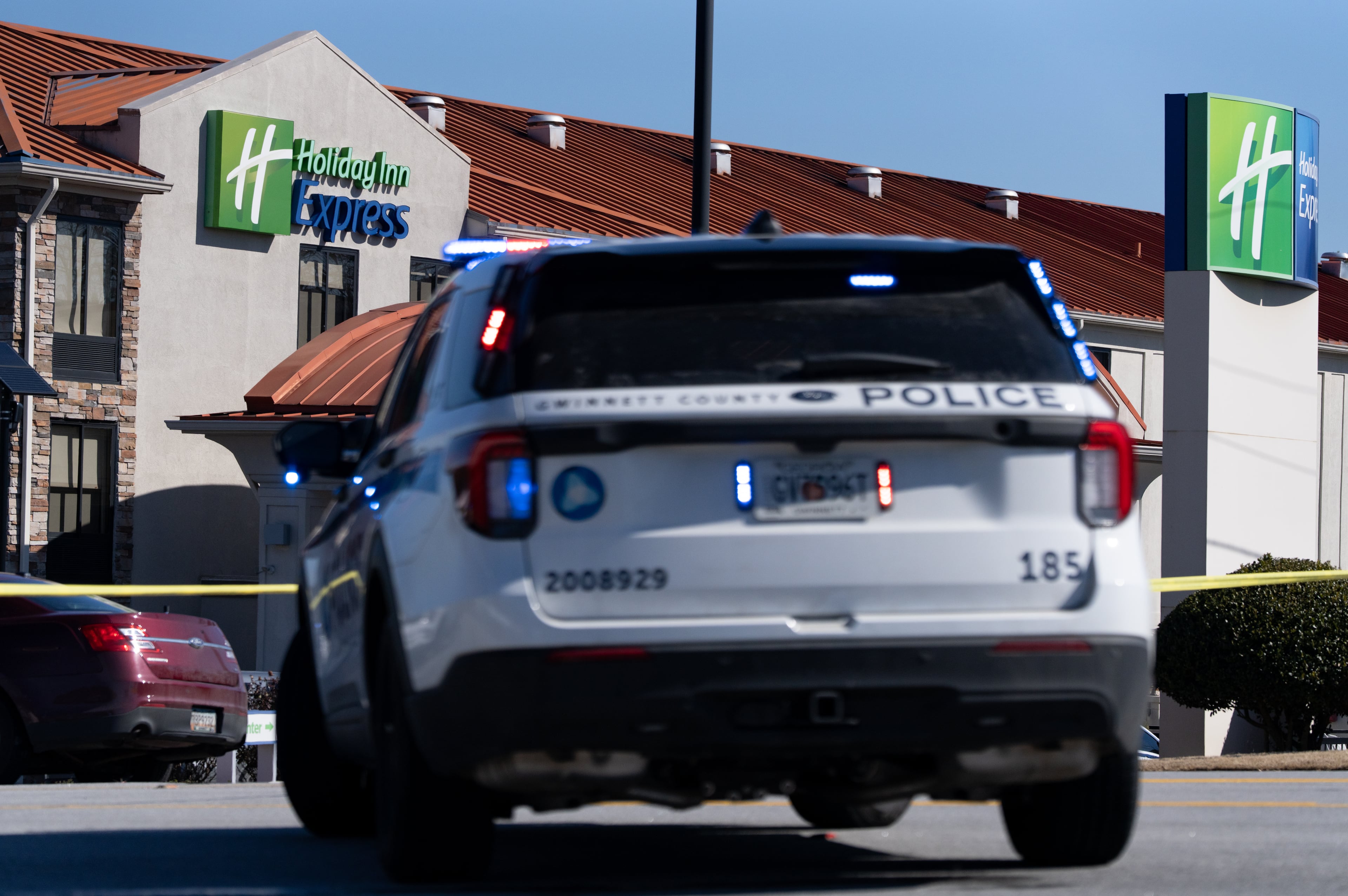Hundreds rally for removal of DeKalb Confederate monument — ‘now’

From the steps of the dark green pavilion on the Decatur square, Rev. Amantha Barbee looked out on a crowd of hundreds and pointed a finger at the object of their collective ire.
The Confederate monument — a 30-foot obelisk now garnished with protest signs and the spray-painted face of George Floyd — was erected to honor hatred and white supremacy, Barbee said into the microphone.
It still honors those things, she said.
It’s got to go, she said.
Now, she said.
“Folks in leadership, please understand that we have a plan,” said Barbee, the senior pastor at Oakhurst Presbyterian Church. “And the plan is to get that down.”
“Not on the 26th, but now.”
The crowd cheered and chanted.
Last Friday, DeKalb County Superior Court Judge Clarence Seeliger ordered that the monument — a long-divisive symbol that's gained new attention in the wake of nationwide protests over racism and police violence — be removed and put into storage.
Calling the statue a nuisance and a threat to public safety, Seeliger gave county officials until June 26 to take it down.
That hasn’t happened yet and the clock is ticking, with a Confederate group threatening imminent legal action to try and keep the monument where it’s stood since 1908.
Thus Wednesday night’s rally: a very public attempt to keep pressure on officials until the obelisk is out of the square.
“For us, it's not over until it's removed and all symbols of white supremacy are removed from this square and from every square foot in Georgia, in this country,” said Mawuli Davis, a local attorney and co-chair of the Beacon Hill Black Alliance for Human Rights.
“It's got to be removed if we're going to be move forward as a society.”
DeKalb County spent several years trying to rid itself of the obelisk but, thanks in large part to Georgia laws that make it extremely difficult to even move Confederate monuments, had no such luck.
The county gave up the fight last year, opting instead to install a contextualizing marker that says the monument was erected to "glorify the 'lost cause' of the Confederacy" and has "bolstered white supremacy and faulty history."
Focus on the monument and others across the South was renewed in recent weeks as protests spread across the country. Those protesting after the deaths of black Americans at the hands of police — including Floyd in Minneapolis, Breonna Taylor in Louisville and Rayshard Brooks in Atlanta — say the monuments glorify men who fought to preserve slavery and are emblematic of the country's history of systemic racism.
With fresh attention on the obelisk in Decatur, city attorney Bryan Downs filed a complaint against DeKalb County, which technically owns the monument. The complaint did not directly challenge Georgia’s Confederate monument laws but instead focused on a code section that allows local judges to address public nuisances that are “manifestly injurious to the public health of safety.”
Seeliger granted the motion and ordered the obelisk removed.
That duty now lies with DeKalb County. But the task hasn’t been completed yet, and it’s unclear when it might be.
County officials have not responded to multiple inquiries this week about potential plans.
The Georgia division of the Sons of Confederate Veterans, meanwhile, says its planning to try and stop the obelisk from going anywhere.
Spokesman Martin O’Toole told The Atlanta Journal-Constitution that the group is drafting a motion asking Seeliger to reopen the case.
“There was no opposition filed by the county to the city's complaint,” O’Toole said, “so we feel that the case has not been heard on its merits.”
O'Toole's group already filed a civil lawsuit this week to try and prevent the relocation of a similar obelisk in the heart of downtown Athens. It has also threatened litigation over the city of Kennesaw's recent decision to remove a Confederate battle flag from a local war memorial.
O’Toole said action could be taken in the DeKalb case as soon as Thursday.
Groups like the Beacon Hill Black Alliance for Human Rights, Hate Free Decatur and other activists were already urging officials to act quickly.
They blasted DeKalb CEO Michael Thurmond for not already having removed the monument. One Beacon Hill member spelled out the email address for DeKalb’s chief operating officer Wednesday night as the hundreds gathered typed it into their phones.
Sara Patenaude, a leader of Hate Free Decatur, said she was glad that Decatur officials for pursued the matter and that Judge Seeliger paved the way for removal.
“But I will not give my praise,” she said, “until we see a crane come in and see that monument leave.”



